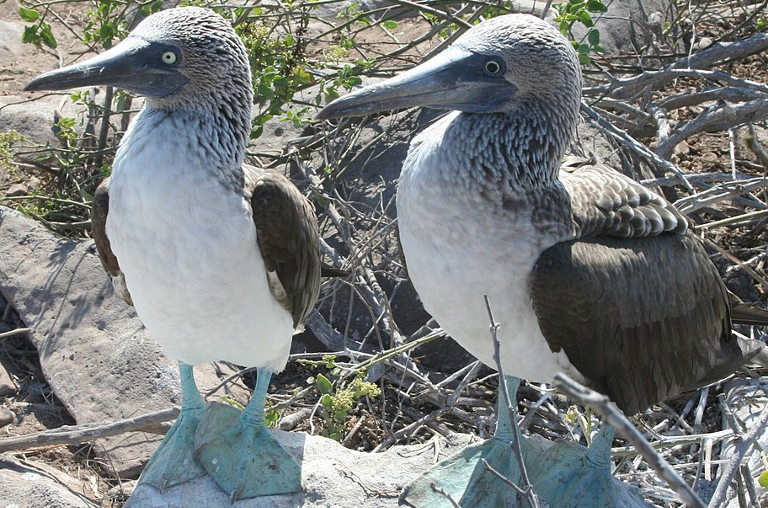A year ago, seven students and I stood overlooking Darwin Bay where Charles Darwin first visited the Galapagos Islands. As part of an Honors class at The University of Toledo, we spent time with giant tortoises and finches, marine iguanas and sea lions. We’d explored habitats from marine to desert to humid uplands. We listened to stories of adaptation of life to changing environmental conditions in this small group of islands in the Pacific, swathed in three oceanic currents and buffeted by temperature changes of the El Niño/La Niña cycle.
Standing in desert perched on lava tunnels a few days before, blue-footed boobies had courted and raised chicks around us, unperturbed by our presence. We learned about intricate courtship rituals and cooperative parenting. We learned about the history of protection of the islands. Though we tend to think of all conservation as local, El Niño cycles were intensifying and placing greater stress on life in the islands, a change attributed to global warming. Were we, seemingly so far away in the global north, contributing to the demise of these islands?
We were there in the wet season, so the desert seemed less dry than expected with shrubs leafed and finches mating. But we had read about the seasonal droughts, and the even harsher conditions of multi-year droughts. The severe droughts drove changes in beak depths of the finch populations, tracking the size of available seeds. Variation in beak depth within the populations led to differential survival and a shift in beak depth of the next generation. Amazing screenshots of evolution by natural selection in action flitted before our eyes.
Yet life on the islands had been resilient enough to persist through these cycles of drought for hundreds of thousands of years. This resilience had been possible because of evolutionary change over time in response to varying environmental conditions. We could see evidence of this change not only in finches, but in most of the island life. I asked the students whether they were personally subject to natural selection, and received some quizzical stares in return.
So resilience and change were on our minds when we received news of the worsening spread of the COVID-19 coronavirus disease. We had many short-term concerns. Would we be able to get back to the U.S.? (Yes.) Would we be able to finish the University semester? (Yes, but not on campus.) Would our loved ones be okay? (So far, so good.)
Then, longer term concerns shaped by our trip entered our discussions. Here was an environmental challenge for which we had no precedent in our lifetimes. Would we persist and adapt? Would we be resilient through change?
We seemed isolated from the forces of natural selection. Lacking major predators other than ourselves, we seemed immune to all but our own influence. Our cultural development – some would say cultural evolution – has buffered us from much of natural selection. Our cultural institutions have standardized dietary and hygienic practices, reducing global levels of infectious diseases. We wondered whether this same cultural transmission of ideas could provide the change needed now. Would humans be willing to “flatten the curve” with social distancing and masks? Time would tell us that the results on this were mixed.
Overlooking Darwin Bay, we watched frigate birds trace the columns of rising air with their spiral flight. Love was in the air here too as males flashed their bright red gular sacks in courtship rituals. It seemed impossibly beautiful from our distant perch though we knew it was fraught with competition for the birds. As often the case, the natural world was a source of awe and optimism from some points of view, and tooth and claw and gular sacks from another. What would our vantage be soon? We had so much to think about.
Teaser photo credit: By Benjamint444 – Own work, GFDL 1.2, https://commons.wikimedia.org/w/index.php?curid=26540141





